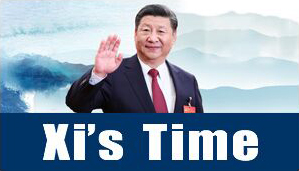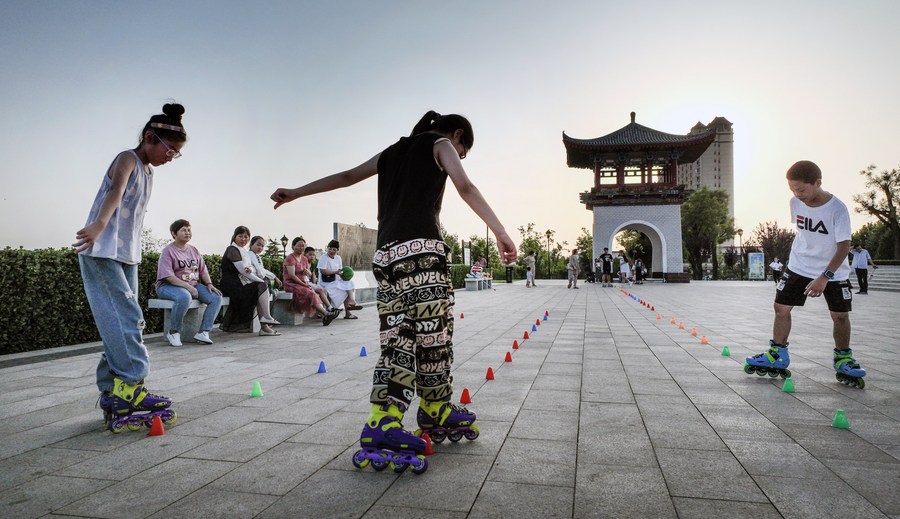
Children enjoy themselves at a park in Heyang County, northwest China's Shaanxi Province, July 8, 2022. (Xinhua/Tao Ming)
by Xinhua writer Guo Yage
BEIJING, July 9 (Xinhua) -- Chinese President Xi Jinping has on various occasions stressed the importance of human rights protection and development, reiterated China's commitment to unswervingly advancing the development of the human rights cause, and called for concerted efforts of all countries to improve global human rights governance.
Under Xi's leadership, China has put respecting and protecting human rights high on its agenda of state governance and development strategy, and has made remarkable achievements in this regard home and abroad over the years.
PROTECTING BASIC HUMAN RIGHTS
On multiple occasions, Xi has emphasized the importance of protecting primary and basic human rights, such as the rights to subsistence and development.
"China insists on a combination of the principle of human rights' universality and the nation's actual conditions, and insists that the rights to live and to development are primary basic human rights," Xi said in December 2016 in a congratulatory letter sent to an international symposium on the occasion of the 30th anniversary of the adoption of the United Nations' "Declaration on the Right to Development."
Just as Xi said, China has long adhered to a people-centered vision of human rights, sparing no efforts in saving lives and improving people's livelihood.
Prioritizing the protection of people's health in its development strategy, China has built the world's largest healthcare system. Facing the COVID-19 pandemic, China has mobilized all resources nationwide, and made unprecedented efforts for medical treatment.
In February 2021, China declared the elimination of absolute poverty, having lifted nearly 100 million rural poor out of poverty over the previous eight years. The country has also made all-out efforts to combat organized crime and clamp down on all illegal activities to safeguard people's rights to live safely.
Surveys by the National Bureau of Statistics detected a continuous rise in Chinese people's sense of security, with 98.4 percent of the population feeling safe in 2020. The figure rose to 98.56 percent in the first half of 2021. China ranked second with 93 points in the 2021 Global Law and Order Report released by Gallup.
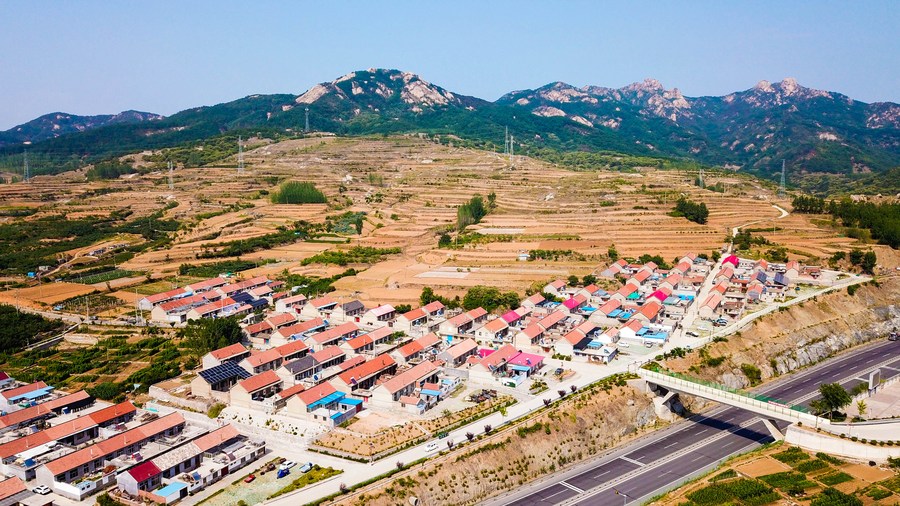
Aerial photo taken on June 18, 2022 shows a view of Hongniya Village in Wulian County of Rizhao, east China's Shandong Province. (Xinhua/Guo Xulei)
The key human rights issues are enough food to eat, adequate housing and the right to education, and "for those three key areas, China has done an amazing job," said President of the New Zealand China Friendship Society Dave Bromwich.
"In my view, China, under the leadership of the Communist Party of China, has done very well in terms of securing fundamental human rights," said Kenya-based international relations scholar Cavince Adhere.
Farhad Javanbakht Kheirabadi, a China scholar at Shahid Beheshti University in Iran, said China's achievements of guaranteeing people's basic human rights, such as the right to life and the right to development, and continuously improving people's living standards, "set an example for other countries."
ADVANCING ALL-ROUND DEVELOPMENT
When addressing the general debate of the 76th session of the UN General Assembly via video on Sept. 21, 2021, Xi said that "we should safeguard and improve people's livelihoods and protect and promote human rights through development, and make sure that development is for the people and by the people, and that its fruits are shared among the people."
"We should continue our work so that the people will have a greater sense of happiness, benefit and security, and achieve well-rounded development," he noted.
Under Xi's leadership, China has coordinated the improvement of human rights related to economy, politics, society, culture and environment. Along with the country's economic development, people's quality of life has been greatly improved.
On average, 13 million new urban jobs were created annually in recent years. The per capita disposable income of residents has exceeded 35,000 yuan (about 5,200 U.S. dollars), up by nearly 80 percent from the 2012 level. The urban-rural income gap was closed significantly, and the middle-income group has grown to over 400 million people.
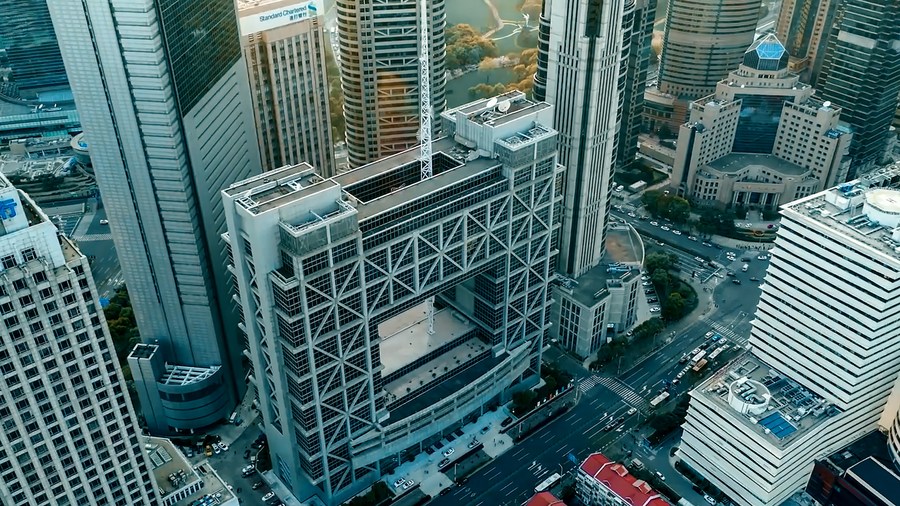
File photo shows an exterior view of the Shanghai Stock Exchange at Pudong New Area in Shanghai, east China. (Xinhua)
In 2021, China's retention rate of compulsory education reached 95.4 percent, with more equal accessibility. The country now has the largest higher education system globally, with 44.3 million students currently at school.
Development is the foundation and key to solving all problems facing the country, as is reiterated in the Chinese government's major development plans and documents, noted Lin Yifu, dean of the Institute of New Structural Economics at Peking University.
"No matter how often you've been to China, during every visit you actually discover something new," said Zahari Zahariev, chairman of Bulgaria National Association for the Belt and Road and former member of Bulgarian Parliament.
The Chinese society, based on socialism principles, has a single goal: "the well-being and the most favorable conditions for development both of the individual and of the social organism as a whole," he said.
In social, economic and cultural fields, "China has continuously set and achieved a series of long-run goals to rejuvenate the nation," said former Tunisian Foreign Minister Ahmed Ounaies.
UPHOLDING GLOBAL HUMAN RIGHTS CAUSE
In his congratulatory letter to the Beijing Forum on Human Rights on Sept. 16, 2015, Xi said China will unswervingly follow the path of peaceful development and uphold human rights causes of both China and the world at large, calling for closer international exchanges and cooperation in the field of human rights.
Attaining full human rights for people is a shared goal of the humanity, he said.
More than six years later, Xi, in a congratulatory letter to the 2021 South-South Human Rights Forum held in Beijing, noted again that "China is willing to work with all developing countries to carry forward the common values of humanity, practice true multilateralism and contribute wisdom and strength to the sound development of the international human rights cause."
Honoring its commitments, China has made important contributions to the implementation of the UN's 2030 Agenda for Sustainable Development, and has been long dedicated to promoting common development and prosperity.
For example, China has conducted agricultural science and technology exchanges with more than 140 countries and regions. It has provided more than 15,000 tons of emergency humanitarian food aid to developing countries in need since the beginning of this year.
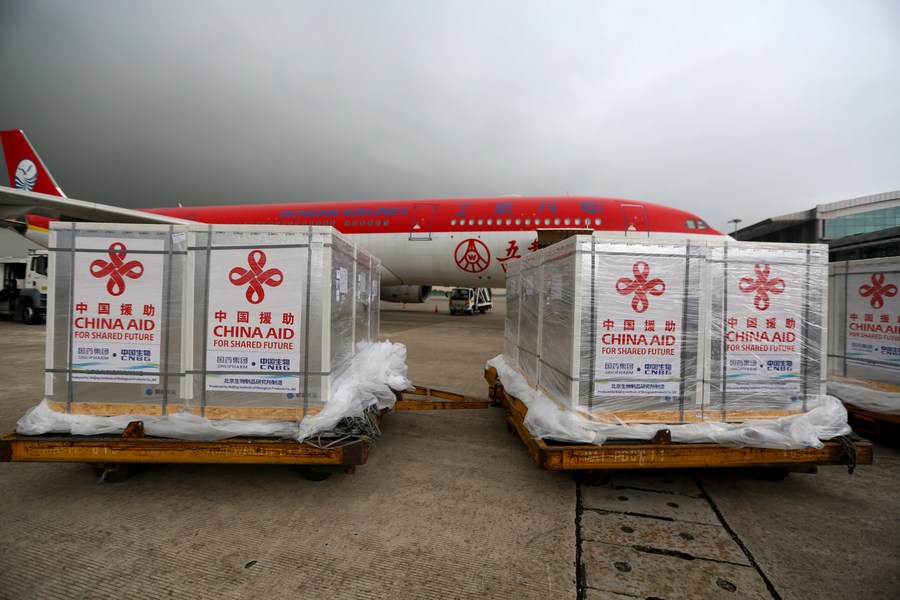
Photo taken on May 29, 2022 shows China-donated COVID-19 vaccines at Yangon International Airport in Yangon, Myanmar. (Xinhua/U Aung)
Last year alone, China provided 2 billion doses of COVID-19 vaccines to more than 120 countries and international organizations, honoring its commitment to making the vaccine a global public good.
Besides, to achieve a balanced, coordinated and inclusive growth worldwide, the Chinese president proposed the Global Development Initiative (GDI) in re-energizing the implementation of the UN's 2030 Agenda for Sustainable Development and building a global community of development.
Mohammed Saqib, secretary-general of the India China Economic and Cultural Council, said China has immensely contributed to the world, especially poor developing countries, through material aid, technical cooperation, human resource development cooperation, the dispatch of medical teams, emergency humanitarian aid, overseas volunteer programs and debt relief.
China-proposed GDI is a very noble cause, and it is going to contribute to world peace and prosperity, said Pakistani Prime Minister Shahbaz Sharif. ■




